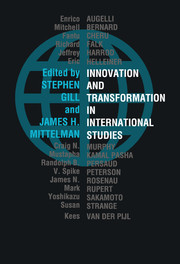Book contents
- Frontmatter
- Contents
- List of contributors
- Preface
- Acknowledgements
- Part I Rethinking and remaking the roots of global social and political theory
- Part II Political economy: the social and ecological anatomy of transformation
- Part III Transformation, innovation and emancipation in global political and civil society
- 9 Globalisation and contested common sense in the United States
- 10 The silent revolution and the weapons of the weak: transformation and innovation from below
- 11 Frantz Fanon, race and world order
- 12 Whose crisis? Early and post-modern masculinism
- Part IV Reflections on global order in the twenty-first century
- References
- Index of names
- Index of subjects
9 - Globalisation and contested common sense in the United States
Published online by Cambridge University Press: 05 July 2011
- Frontmatter
- Contents
- List of contributors
- Preface
- Acknowledgements
- Part I Rethinking and remaking the roots of global social and political theory
- Part II Political economy: the social and ecological anatomy of transformation
- Part III Transformation, innovation and emancipation in global political and civil society
- 9 Globalisation and contested common sense in the United States
- 10 The silent revolution and the weapons of the weak: transformation and innovation from below
- 11 Frantz Fanon, race and world order
- 12 Whose crisis? Early and post-modern masculinism
- Part IV Reflections on global order in the twenty-first century
- References
- Index of names
- Index of subjects
Summary
Drawing on the theoretical resources of Gramsci and of the historical materialist tradition, Robert Cox has defined a vision of global politics in which social forces, states and world orders are seen as organically related aspects of social reality, historically produced through processes in which material social relations and social self-understandings are together deeply implicated.
Viewing the world through the lenses of Cox's Vichian historical materialism (1981: 132–59, 171), it becomes possible to interpret relations and processes obscured from (and by) more mainstream statecentric visions of International Relations and International Political Economy. Taking the stance of a critical theorist, Cox has challenged us to look for and make explicit the political possibilities latent in the social relations and dynamics of the present.
In the spirit of this challenge, I will suggest that changes are underway in the nexus of relations linking the United States to the global political economy, changes which present possibilities for significant political reconstruction. The extent to which any of these possibilities are realised depends upon struggles in which social self-understandings and ideologies of globalisation will play a crucial role. An important prelude to my more substantive discussion, then, is a brief digression on the importance of popular ‘common sense’ for an historical materialism of this kind.
- Type
- Chapter
- Information
- Innovation and Transformation in International Studies , pp. 138 - 152Publisher: Cambridge University PressPrint publication year: 1997
- 10
- Cited by



